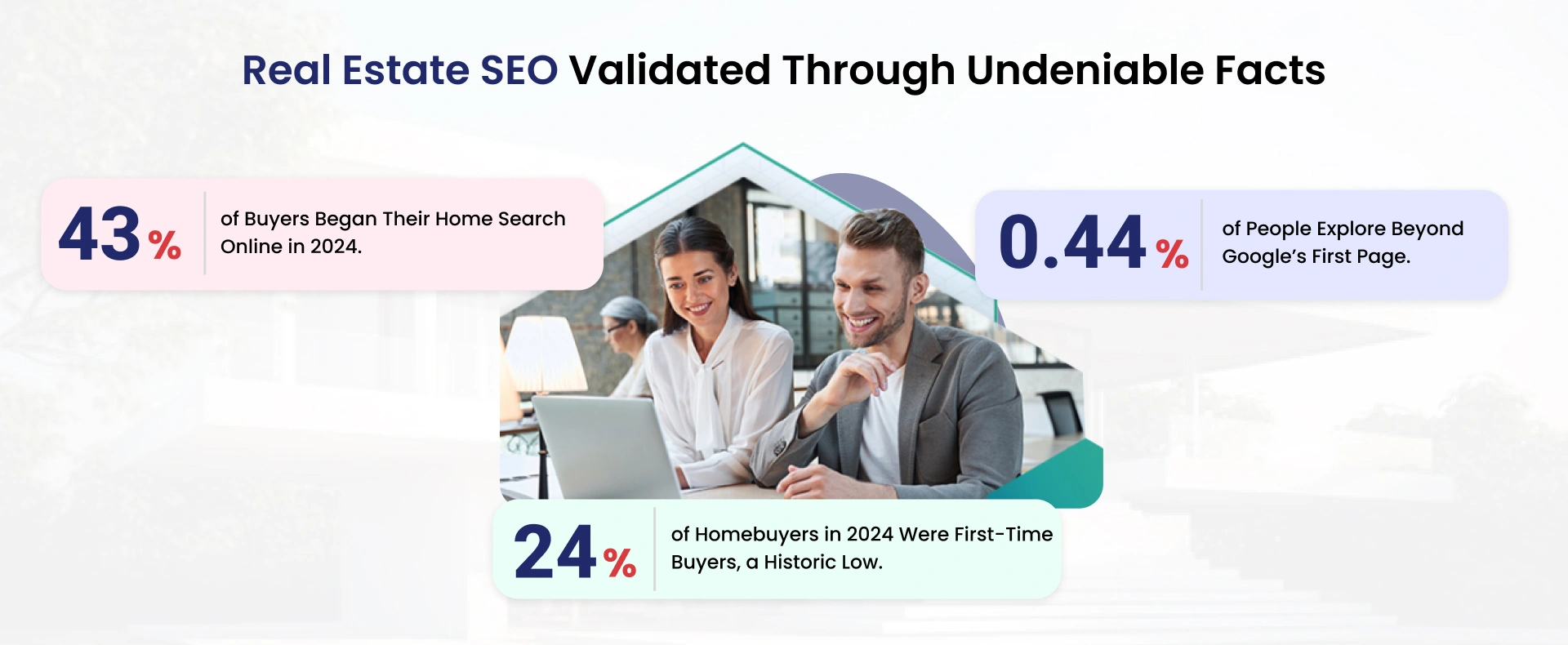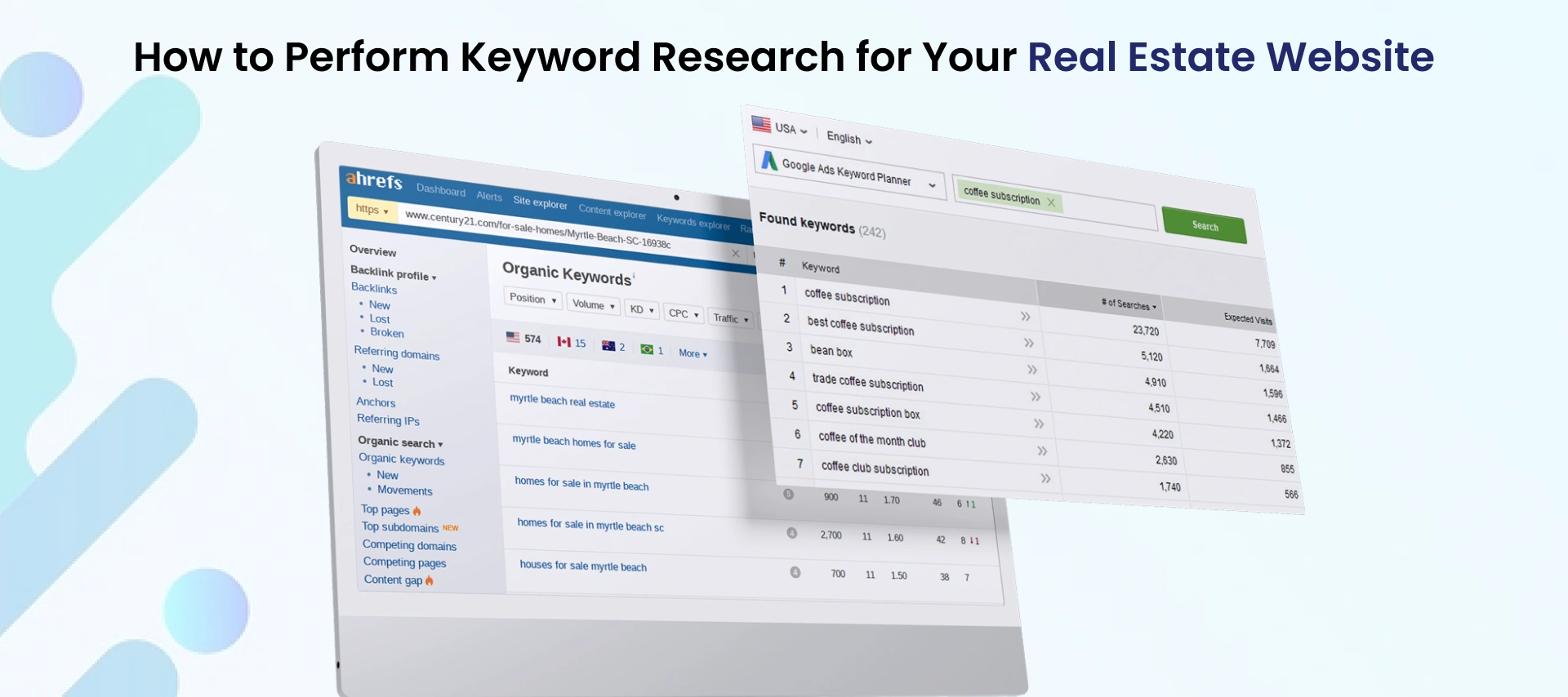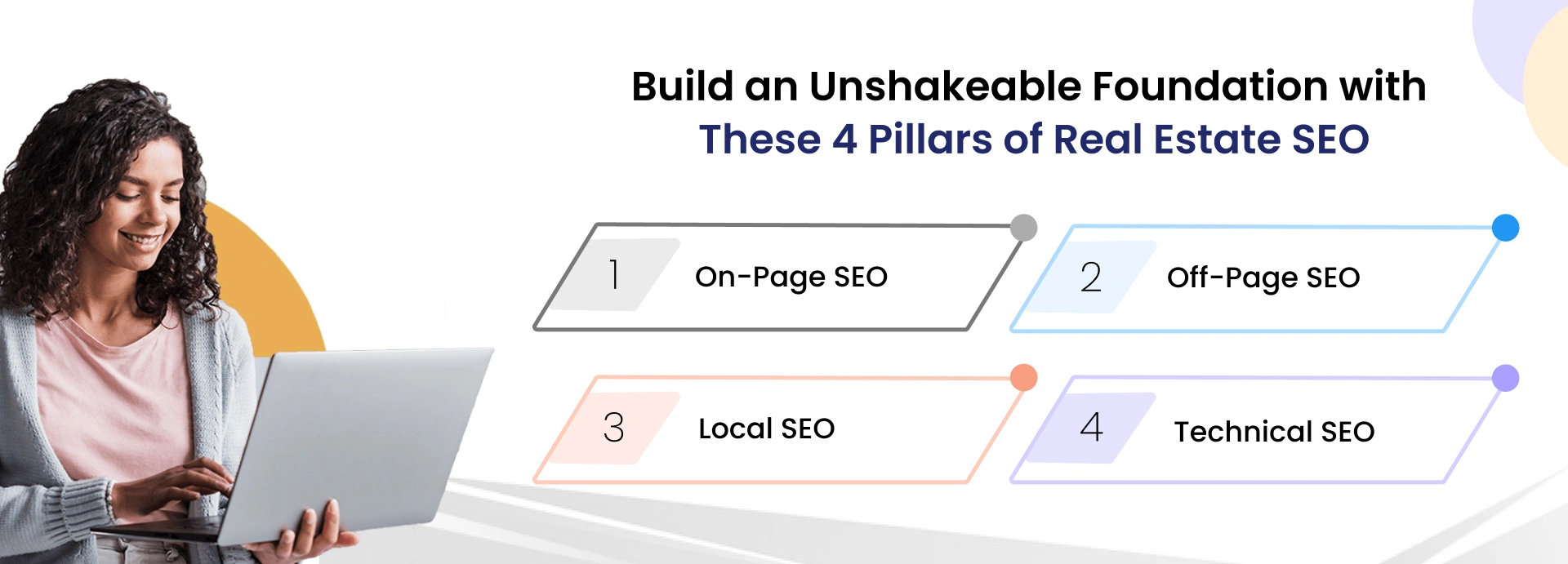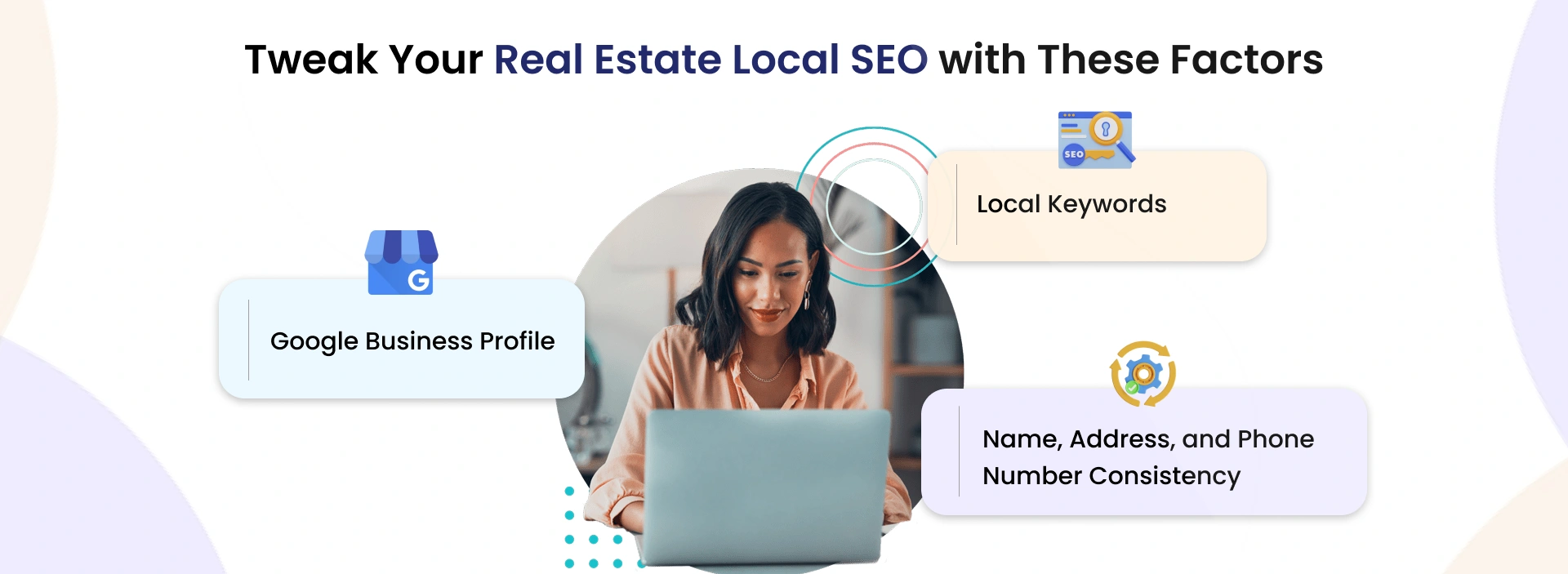
Imagine a homebuyer in your area, coffee in hand, Googling “best real estate agent near me.” If your website is not at the top, guess who’s getting the click? Your competitor. This is the reason search engine optimization for real estate is so robust. It decides who gets a particular lead and who does not.
Take a look at these statistics:

Unlike advertisements that cease to exist when funding is withdrawn, SEO works diligently 24 hours daily for serious sellers and buyers without any budget. It isn't a matter of keyword stuffing. Instead, it requires an innovative strategy that employs on-page optimization, backlinks, technical improvements, and local SEO to capture high-intent leads ready to engage. Are you giving your competitors easy access to leads because your business is hard to find? Let's change that.
Will your prospective clients and sellers find you during their online search? Proper SEO can put you ahead of your competition, give you a lift in search engines, and turn site visitors into actual customers. Learn the basic strategies for real estate search engine optimization: keyword research, content marketing, and local optimization.

Real estate is super-local. As a Miami realtor, showing up for "homes for sale" isn't enough. The search queries to rank for include "best real estate agent in Miami" or "luxury condos in Miami Beach," as buyers and sellers type in Google's search box.
First things first - Optimize your Google Business Profile (GBP). If you haven't claimed and updated it, you're missing out on a giant source of unrestricted local traffic. Ensure you have the correct contact information, professional images, the areas you work in, and positive reviews on your listing.
Now, speaking of reviews, Google loves them, and so do potential clients. Having a good solid collection of five-star reviews helps build trust and shows Google that you're a reputable choice in the area. Get previous clients to write thorough reviews about their experience working with you, with keywords in them. More reviews = more ranks = more leads.
Beyond Google, listing your business with real estate directories like Zillow, Realtor.com, Redfin, and even Yelp heightens credibility. Not to forget about being referenced in local news articles, community blogs, and real estate publications; they do wonders in building authority and convincing Google that you are the go-to expert in your market.
One of the main mistakes agents make is targeting broad, competitive keywords, such as "real estate agent" or "homes for sale." Such terms are notoriously difficult to rank for, especially when competing against large listing sites.
Your focus should instead be on long-tail and location-specific keywords that make serious buyers and sellers in your area conscious of you. Rather than trying to rank for "homes for sale," aim for phrases like "affordable homes for sale in Austin" or "luxury condos in Miami Beach with ocean views."

Another smart tactic? Answer the exact questions your target audience is searching for in your content. People don't only look for homes; they look for advice. Blog posts like "Is now a good time to buy a home in Los Angeles?" or "The hidden-gem neighborhoods in Chicago" establish you as a local expert and drive traffic to your site.
Video is no longer an optional extra; it is utterly essential. Property tour videos generate up to 403% more buyer inquiries than those without. Video has much more to offer than just an added asset for showcasing houses; it serves as a magical formula for search engine optimization for real estate.
Upload market update videos, home-buying guides, and neighborhood tours to YouTube so your content will rank in both Google and YouTube search results. Optimize video titles, descriptions, and tags with relevant keywords like "Best Places to Live in San Diego" or "Real Estate Market Predictions."
Further, cross-posting videos on Instagram Reels, Facebook, and TikTok would amplify their visibility. Short friendly clips highlighting market developments, new listings, and home-buying tips work magic across social media and keep your brand in front of potential clients.
Good content will not save rankings if you have a slow or outdated site. Google rewards the fast, user-friendly sites. Bad loading time, not mobile-friendly? Then where will your rankings (and leads) be?

Does your site not meet these specifications? No matter how good the content is, you will not get a good ranking on Google.
Another thing often overlooked is Schema Markup, the type of structured data that allows Google to show property details (price, availability, images) directly on the search results page. When websites correctly implement schema markup, they see a rise in click-through rates and rankings.
Do you want quality backlinks that will work for your rank? Stop chasing this spammy link and get featured with the sites that matter.
One of the best ways here is through local PR and news mentions. Reach out to local news websites with insights on real estate. Or, guest blogging. Who would not like to write on real estate publications like Inman, BiggerPockets, and HousingWire? This positions you as an industry leader, and the high-authority links provided will also boost your seo for real estate websites.
Imagine a website that takes forever to load, frustrating. An outdated site directs traffic away from potential clients. Here's how you can keep things sprightly:
There is a direct link between social media and SEO, as it drives traffic to the website and improves the online presence.

SEO isn't a set-it-and-forget-it kind of thing; you must keep looking at your stats occasionally. Here is how:
Buying Low-Quality Backlinks Spam links can penalize you rather than boost a ranking.
SEO is not a fixed, forget it strategy-it's a calculated game plan. Think of it as constructing a home: if your foundation is the whole thing, it crumbles. Master these four pillars of search engine optimization for real estate, and you'll outrank competition, attract more clients, and claim dominance in your market. Here's the breakdown.

Your website is your online storefront, not optimized, visitors (and Google) will walk past you. Search engine optimization for real estate websites ensures your pages are friendly to search, engaging, and informative, making them add value for both users and search engines.
If On-Page SEO is the foundation of your website, Off-Page SEO is its reputation. Google ranks sites high on trust, and sound real estate SEO strategies will work great for you to raise your credibility online.
Even if you write the best content, it will not be ranked if it involves a technical mess-up on your site. Technical SEO is crucial because Google prefers fast, secure, mobile-friendly websites; otherwise, you will lose traffic before you start.
Real estate is about location, and your SEO must reflect that. Local SEO will help you stand out when buyers and sellers look for agents in your area.

Many real estate professionals use Google Ads, Facebook Ads, or Zillow leads to generate business. These are suitable methods, but unfortunately, they offer no lasting effect because the leads will cease once you stop paying. It's a constant cycle of spending without any long-term value-added.
This is where search engine optimization for real estate comes to the rescue. Rather than renting space on online pages using ads, seo for real estate websites allows one to appear at the top of the search results permanently. Some upfront work is involved, but once ranking is achieved, the same traffic flows from several high-quality leads without the need for click payments.
And let's face it; would you rather keep throwing money into paid ads or leverage a strong online presence that keeps sending you leads? SEO for real estate websites targets buyers and sellers looking for a house or an agent in your locality. These high-intent leads are worth their salt and are more likely to turn into actual business.
|
Factors |
SEO (Search Engine Optimization) |
Paid Ads |
|
Cost |
One-time or ongoing investment, but traffic remains free over time. |
Continuous spending is required once you stop paying, leads disappear. |
|
Time to See Results |
Takes 3-6 months to build rankings but delivers sustained traffic. |
Delivers instant traffic but disappears as soon as the budget runs out. |
|
Lead Quality |
High-intent leads are people actively searching for real estate services. |
Often, cold leads users may click out of curiosity, not with serious intent. |
|
Traffic Longevity |
In the long term, once ranked, the site can attract traffic for years. |
Short-term traffic stops the moment the ad budget runs out. |
|
Credibility & Trust |
Higher credibility users trust organic search results more than ads. |
Lower trust, many users skip paid ads, viewing them as less authentic. |
|
Click-Through Rate (CTR) |
Generally higher than ads since organic results get more clicks. |
Lower than organic results, many users scroll past paid ads. |
|
Competition |
Can outrank competitors with better content & SEO strategies. |
High competition bidding wars increase ad costs over time. |
|
Return on Investment (ROI) |
With a higher ROI over time, SEO traffic is free after ranking. |
Lower ROI cost per click (CPC) keeps increasing, making it expensive to maintain. |
Let's just get real. SEO is no trick; it is a long game that pays dividends over time if correctly done. It secures traffic from organic searches for your website and delivers high-quality leads while you feign ignorance of paying for ads.
The more time and effort you invest in researching keywords, creating content, playing with local SEO, and adopting technical fixes, the greater your chances of overtaking your competitors, thus creating that rock-solid online presence with our Seo Services
But at the end of the day, let's be honest, seo for real estate websites can be a real set-back. It takes knowledge and time to keep up with algorithm changes, ensure the technical fix is done, and use other content strategies. JanBask Digital Design can be a solution.
JanBask helps unlock the full potential of SEO by creating customized strategies for our clients. Whether you need your website optimized, local rankings improved, or organic traffic driven, we’re there.
Turn Clicks into Closings – Get More Leads with Real Estate SEO!

Leave a Reply